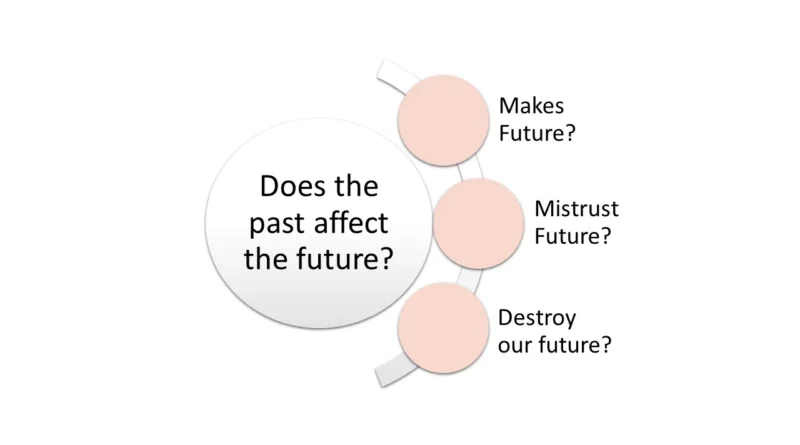Does the past affect the future? Essay for UPSC
Dear friends, Thanks for visiting Newscoop. In this article, we have covered an essay on the topic relevant to “Does the past affect the future“. So, after reading all the important points listed below, we will be able to understand:
How does the past affect the future?
Here future signifies changes that are impending in our lives. On the other hand, the past signifies something that has continuity or permanence in its nature. When people suspect that changes that are going to take place are not in their best interests they try to resist these changes and continue to hold their earlier beliefs, practices, and customs in short their past.
There is a sense of certainty when people talk about the past or they perceive that they can be certain about their past while talking about it or while making its sense. On the other hand the future most of the time appears nebulous. It creates a sort of apprehension in the mind of people who have less than the required clarity about what is going to happen. These people naturally are found to be reposing their trust in their experience from the past rather than in the promise that the future might hold. This is clearly seen when early marriages of girls are given higher preference than higher education.
In this fast-changing world, it is rather difficult to make sense of what the future holds for us. When this happens because people find it comfortable to keep clinging to the past which promises some sense of certainty and thereby a sense of security.
People who lack agency or capacity to shape their future are often found wary to accept the changes happening around them. Rather they take pride in asserting their past in the form of identity. This can be clearly seen when identity politics become prominent as a sort of reaction against modernization ushered in due to globalization.
The clash of traditional identities against modern cultural practices is a case in point. Youth who are largely unemployed or who cannot be part of fast-paced modernization in society are found to be indulging in asserting their traditional identities and acting violently against those who adopt modern cultural practices. For example beating of girls who had gone to the pub by a fringe group gives insight into such behavior.
Whatever a society today is largely attributed to what happened in the past. The contributions of past generations are seen with a certain pride. Society often pays tribute to such contributors. However, when society fails to give rise to further such contributors, it is left with little option but to indulge in the excessive glorification of the past. For example in India, it has become a fashion to bring up our historical achievements on every occasion because we have relatively few things to boast about in the present era. This frequent glorification of the past has become symptomatic of our collective failure to generate groundbreaking innovation.
Our past acts as an anchor which can provide us with a sense of stability or a sense of identity about who we are. Even if our past is not sometimes that glorious or full of darker periods or events when we become confused or uncertain about the future or feel that we cannot shape it the way we want we try to rationalize our past. We tend to create justifications for our past. This is because if we don’t do it we feel that we may lose our sense of identity. We feel that we would be rudderless. We feel that there will hardly be some things that would make us proud when we look back.
Even if a society wants to give up its past, it needs an alternative to substitute for the past. If the future is not promising to provide such an alternative it makes little sense for a society to give us what it has nurtured and cherished so far.
Sometimes changing times create so much demand for people to change their way of life, people feel that such changes are actually warranted. This tendency to not accept changing circumstances makes people less receptive towards things that are promised by the future. On the contrary, their beliefs in things in the past further strengthened and consolidated.
Memories about the past evoke a feeling of nostalgia. We tend to indulge in romanticizing the past. This cannot be done in the future. Somehow we continue to believe that whatever there was in the past was better than whatever will be in the future. This creates further mistrust of the future setting up a vicious cycle. Thus, mistrust of the future and nostalgia about the past feed on each other.
Mistrust of the future is largely seen among the elders who have gathered an experience of life. On the other hand, young people who are inexperienced would always look forward eagerly to receiving their future with much greater anticipation and hope.

What makes to mistrust our future?
The following points show how does the past affect the future?
- We do not perceive that the future holds certain promises for us.
- We fear the pace of change happening around us.
- We lack the agency or capacity to shape our future.
- We are somehow excluded from the process of deciding our future.
- Our life experience makes us less open to changes that the future promises to us.
- Changing time makes huge demands on us.
- We fail to see an alternative to our past.
- The future appears threatening in a sense that would take our rich traditions and cultures.
- The future appears to threaten the status quo and thus our comfort zone.
- We do not trust people who appear to have an influence on our future, for example – politicians, rich and wealthy people.
- Failures of individuals and institutions in the past, especially those that had a considerable impact on our lives, make us prone to mistrust them as far as their influence on the future is concerned.
- The lack of role models who can make us hopeful about the future creates an uninspiring environment in which people prefer to cling to the past.
Also Read: Technology Cannot Replace Manpower
How does the past help our future?
The following point can describe how your past makes your future.
- Past provides us with a sense of identity and a sense of certainty.
- Past evokes a sense of nostalgia about the bygone days.
- Past reinforces our beliefs through life experiences.
- It does away with the need to cope with the large-scale changes taking place around us.
- It acts as a tool to assert our identity against those who appear to be major beneficiaries of promises made by the future.
- It provides us with something that can act as a source of pride for us.
- It acts as a source of learning or inspiration for us.
- It acts as a guide for future generations.
Does the past affect the future?- Examples
- The lack of response from the judiciary to reforms that are sought in judicial appointments is a clear testimony of a lack of trust in people who are going to be empowered in appointing judges.
- Lack of trust in women’s capacity has prevented us from carrying out institutional reforms like 50 percent reservation in parliament. We are still reposing our faith in the current setup.
- The rollback of nuclear energy usage by some countries like Germany, Italy, and Switzerland, has its genesis in their mistrust of the safety aspect of nuclear power plants. This is especially after
- the fallout of the Fukushima nuclear disaster. These countries would be resorting to old
- ways of producing energy.
- Reassertion of traditional identities through religious and cultural symbols by youth, especially those who cannot compete in the era of modernization and globalization can be another example where they appear to be mistrusting the future.
Conclusion
Though it is sometimes natural to feel apprehensive about what the future holds for us or feel a bit of resistance towards changes taking place around us that signify our future, it still does not make sense to remain completely cynical about the future when it is inevitable to face it. The wisdom on the other hand lies in learning from our past in such a way that this learning can help us to reap rich dividends from the promises or opportunities that our future has in store for us.
We hope you get to know all the factors related to the topic-“Does the past affect the future? “. Please share this article if you like.

